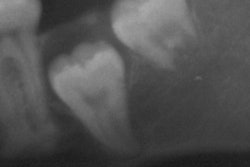
Is intravenous (IV) acetaminophen a viable pain management option after third-molar extraction? In a recent study, researchers tested intravenous acetaminophen against a placebo of IV saline in 72 patients to find out.
The team measured patients' postoperative pain scores at three points after surgery and found no statistically significant differences in these scores between the acetaminophen and placebo groups. The study was published in the Journal of Oral and Maxillofacial Surgery (March 9, 2018).
"The use of IV acetaminophen showed no statistically significant decrease in patient pain at either four or 24 hours postoperatively," the authors wrote.
The lead study author was Isabel Atencio, DDS, a research fellow in the department of oral and maxillofacial surgery at the Case Western Reserve University School of Dental Medicine in Cleveland.
Opioid alternative?
With growing awareness of the need to find an alternative to prescribed opioids for postsurgical pain management, the researchers wondered if an IV formulation of acetaminophen (Ofirmev, Mallinckrodt Pharmaceuticals) would be effective for patients who had impacted third molars extracted. They also hoped the results would offer an alternative to the use of postoperative narcotics.
The researchers conducted a randomized, double-blind, placebo-controlled trial with 72 patients undergoing scheduled third-molar extractions. These patients were previously diagnosed with either partial bony or complete bony impacted third molars and avoided long-acting local anesthetics or dissociative anesthetic agents.
All 72 patients received standard-of-care medications, including IV sedation with 50 µg of fentanyl, propofol, or methohexital and up to 5 mg of midazolam. They also received an inferior alveolar nerve block or local infiltration, as appropriate with 4% articaine with epinephrine diluted to 1:100,000.
Half the patients received the IV acetaminophen (100 mL), and the other half received a placebo consisting of an IV solution containing 0.9% saline (75 mL). Both the acetaminophen and saline were administered as a 15-minute infusion after the extraction procedure was completed. The researchers collected patients' postoperative pain scores via a verbal rating scale immediately after the surgery and at four and 24 hours postoperatively. One patient in the acetaminophen group dropped out.
The researchers reported no significant difference (p < 0.05) between scores for either group. A difference was recorded for pain reduction at 24 hours postoperatively, but it was not statistically significant, the authors noted.
| Postoperative pain scores in IV acetaminophen & placebo groups | |||
| Pain scores | Placebo group (n = 36) |
Acetaminophen group (n = 35) |
p-value |
| Median score immediately after operation | 0 | 0 | 0.299 |
| Median score 4 hours after operation | 6.0 | 6.0 | 0.276 |
| Mean pain score 24 hours after operation | 4.1 | 3.8 | 0.565 |
Proven efficacy
The authors reported no study limitations, but they explained that the postoperative pain scores for both groups immediately after the procedure may represent the ongoing effect of the preoperative nerve block rather than the effectiveness of acetaminophen.
While they found that IV acetaminophen did not significantly decrease patient pain in the in their study, the authors noted that previous research suggests acetaminophen may have a role to play in reducing a patient's postoperative pain.
"Given the volume of literature available on the efficacy of acetaminophen, it is prudent not to discard this medication as an additional tool in our arsenal for the minimization of postoperative pain," the authors concluded.



















